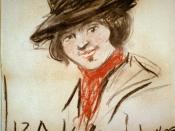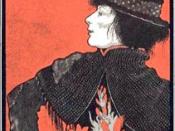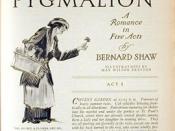The play, "Pygmalion" and the novel "Wide Sargasso Sea" are texts distinct in genre types but both exhibiting feminist perspectives with a touch of modernist approach. More importantly, both have settings in the Victorian era, a time where male dominance is the norm and essentially, a patriarchal society is thought to exist. This essay examines if these two works enhance the projection of a patriarchal society, a situation where the female succumbs and the male prevails. The personalities of the main characters in both works will be examined against the distinct social backdrop to ascertain if the above statement holds true.
An analysis of Higgins' character and behaviour allows readers to ascertain whether he is a male figure of authority. Higgins is portrayed as an arrogant, authoritative man who says aloud what he thinks irregardless of other's feelings. Clearly, he is a bully who enjoys being in control in situations as shown in his arguments with Mr Dolittle where he dismissed him quickly.
(Shaw pp.22,53,115, Block 5 pp.32)
His portrayal of his dominance is evident towards Eliza where she was not treated as an independent person. He felt that he had given Eliza a new lease of life and had absolute rights over her to treat her deem as he fit. This is shown clearly through his abusive behaviour verbally and psychologically towards her, where he called her "a squashed cabbage" and forced her to undergo the rigorous training in phonetics. (Shaw, p. 24, 27)
Higgins treated Eliza as if she is void of emotions, without a mind of her own, using chocolates, taxis and jewellery as baits. When Eliza complained, he tried to silence her with chocolates as if she were a child. (Shaw, p.65).
However, there is a streak of passiveness in...


